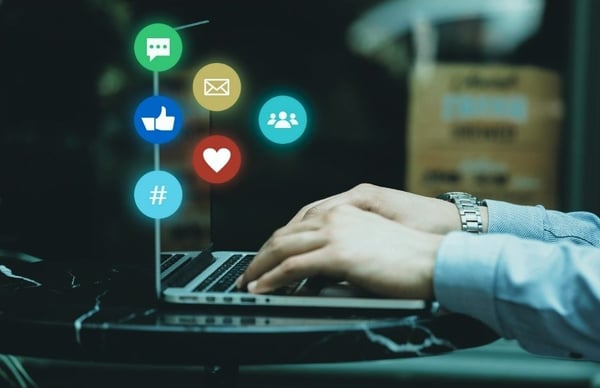Social media has become a ubiquitous part of our lives. It has revolutionized the way we interact with each other and conduct business. While social media has many benefits, it can also have a significant impact on cybersecurity. Are your social media accounts creating unnecessary cyber risks?
For many businesses, social media has become an important tool to connect with their customers, raise brand awareness, generate leads, and provide customer support. However, if companies are unaware of the potential cyber risks involved, there can be serious consequences. Below we’ve included some of the ways social media impacts cybersecurity as well as measures you can take to protect your business.
Phishing and Malware Attacks
The potential for phishing and malware attacks is one of the biggest security risks when it comes to social media. Hackers will often social media to create fake profiles or hack into legitimate accounts to spread malware or steal sensitive information. Messages or posts that look genuine can be used to lure victims into clicking on a link or downloading a file that contains malware. To protect your business against these attacks, your employees should be educated about phishing and malware attacks and you should encourage them to be cautious while interacting with unknown profiles or clicking on links. In addition, you should have an anti-malware software in place on your company devices.
Data Leakage
Plenty of companies use social media for their business activities putting them at risk of data leakage where sensitive information may be accidentally or intentionally disclosed on social media. Employees may inadvertently share confidential information on social media, putting the business at risk of a data breach.
To help avoid this from happening, you should define clear guidelines for social media usage and educate your employees on what data can and cannot be shared on social media. Additionally, you can implement strict privacy controls to limit access to sensitive data.
Reputation Damage
Social media can be a double-edged sword for businesses. On one hand it can help businesses reach their target audience and promote their brand, on the other hand it can also cause significant reputational damage if used inappropriately. If attackers gained complete control of your business' social media accounts, they could post damaging content. A single post or tweet can go viral, and negative comments can quickly spread, causing long-lasting damage to your business' reputation. In fact, an analysis released by the Identity Theft Resource Center (ITRC) last year, stated that social media account takeovers increased by more than 1,000% in 2022 - a good reason to also make sure that your multifactor authentication is on and password policies are up-to-date and compliant with best practices.
You should regularly monitor your business’ social media accounts for negative comments and respond to them quickly and professionally. In addition, it’s a good idea to have a crisis management plan in place to handle any reputation damage.
Social Engineering
Cybercriminals use a tactic called social engineering to manipulate individuals into divulging sensitive information. Cisco states that, “social engineering has become one of the most common ways for attackers to breach an organization's initial defenses to cause further disruption and harm. One of the greatest dangers of social engineering is that the attacks don't have to work against everyone: A single successfully fooled victim can provide enough information to trigger an attack that can affect an entire organization.” Unfortunately, because it is easy to create fake profiles and gather information about a person's personal life, interests, and activities, social media can provide an ideal platform for these attacks.
It's important to make sure to educate your employees about social engineering tactics and encourage them to be careful while interacting with unknown profiles. You can also implement strict privacy controls to limit the amount of personal information available on social media platforms. Additionally, you can use multi-factor authentication (MFA) and email security that includes anti-phishing defense.
While social media undeniably provides many benefits to businesses, it can also present some significant security risks. If you would like assistance in ensuring your company's data is protected, please contact us and we would be happy to help.
Related Content:
SECURITY CONSIDERATIONS OF SOCIAL MEDIA
AI SCAMS: WHAT TO WATCH OUT FOR IN 2023
-1.png?width=350&height=117&name=iuvo_logo_blue_Transparent%20(1)-1.png)
